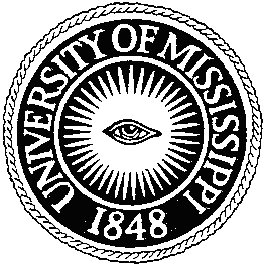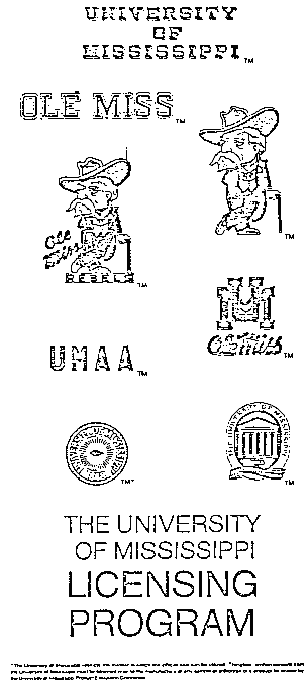Trademark Trial and Appeal Board
Patent and Trademark Office (P.T.O.)
*1 IN RE THE UNIVERSITY OF MISSISSIPPI
Serial No. 394,313
January 6, 1987
William D. Stokes for applicant
David A. Herdman
Trademark Examining Attorney
Law Office 4
(Thomas Lamone, Managing Attorney)
Before Rice, Rooney and Simms
Members
Opinion by Simms
The University of Mississippi has appealed from the refusal of the Trademark Examining Attorney to register the emblem reproduced below
as a certification mark. [FN1] The specimens submitted by applicant include gold seals which are affixed to diplomas of students graduating from applicant's institution. In the application applicant indicates:
The mark certifies that the person holding certificate so marked has satisfactorily completed the course requirements for a degree as set by the faculty and Chancellor of The University of Mississippi.
The Examining Attorney has refused registration primarily upon the ground that the seal sought to be registered does not function as a certification mark within the meaning of that term in Sections 4 and 45 of the Trademark Act, 15 USC §§ 1053 and 1127. Rather, the Examining Attorney contends, applicant's mark may be a service mark identifying applicant's educational services. The Examining Attorney has also made final requirements for disclaimers of the assertedly geographically descriptive words UNIVERSITY OF MISSISSIPPI and the informational year of applicant's founding--1848--and the requirement for a definite statement of the goods or services certified.
We affirm.
Section 45 of the Act defines a certification mark as follows:
The term 'certification mark' means a mark used upon or in connection with the products or services of one or more persons other than the owner of the mark to certify regional or other origin, material, mode of manufacture, quality, accuracy or other characteristics of such goods or services or that the work or labor on the goods or services was performed by members of a union or other organization.
Section 4 of the Act provides for the registration of such certification marks by persons and others who exercise legitimate control over the use of such marks. In addition, the Examining Attorney has referred to Section 14(e) of the Trademark Act which provides for cancellation of a certification mark at any time on the ground that the registrant
(1) does not control, or is not able legitimately to exercise control over, the use of such mark, or (2) engages in the production or marketing of any goods or services to which the certification mark is applied, or (3) permits the use of the certification mark for purposes other than to certify, or (4) discriminately refuses to certify the goods or services of any person who maintains the standards or conditions which such mark certifies . . .
It is clear, therefore, that the Trademark Act contemplates the registration of certification marks by the owner where such mark is used only to certify, among other things, that goods or services of others meet certain standards of quality or other characteristics. Trademark Rule 2.45 also requires that an applicant seeking to register a certification mark allege that the applicant exercises legitimate control over the use of the mark and that he is not himself engaged in the marketing of the goods or services to which the mark is applied. See also TMEP Section 1305.14. In an amendment submitted October 3, 1984, applicant has made these required assertions. The accuracy of these statements as it applies to the use of the mark sought to be registered is discussed below.
*2 Trademarks and certification marks are by nature mutually exclusive. That is, if a mark is being used to certify quality, for example, it may not be registered as a trademark. McCarthy, Trademarks and Unfair Competition (2d ed. 1984) § 19:32 D. Therefore, a symbol is not used as a certification mark if it is used to 'certify' the owner's very own products or services. In re Celanese Corp. of America, 136 USPQ 86 (TTAB 1962).
As the McCarthy treatise notes, there are several different types of certification marks. The Good Housekeeping Seal of Approval demonstrates one type of certification mark--a certification of quality of goods manufactured by others. Another example is the Underwriters Laboratories certification mark. Contrasted to trademarks, these marks do not perform the function of identifying and distinguishing the goods of any one producer but rather certify that others' goods or services meet certain standards or conditions. The owner of the mark sells neither the goods nor services which it certifies, although other goods, such as magazines, may be produced by the owner of the mark. In re Monsanto Co., 201 USPQ 864, 869 (TTAB 1978). The availability of these marks to producers of goods or services whose goods or services meet the standards or conditions set by the certifier have been called a form of limited compulsory licensing. See McCarthy, supra, § 19:32 F, and the discussion of the duty of a certifier to certify the goods or services of any person who meets the standards and conditions which the mark certifies in Monsanto at 870.
The seal applicant here seeks to register as a certification mark is used by the university through its chancellor to apply to diplomas or certificates of graduating students to indicate that they have successfully met the standards of experience, skill and competency promulgated by the various schools and colleges of applicant, confirmed through its program of 'rigorous inquiry and testing.' While applicant maintains that the seal is a 'certification' that the named student has met certain standards of proficiency and complied with the requirements established by the university, as can be seen from the foregoing discussion what applicant seeks to register is not in fact a certification mark as defined by the Act but rather may be a service mark identifying and distinguishing applicant's educational services. It is clear that applicant is not certifying the quality or characteristics of any goods or services of others as is required of a certifier. The specimens evidence use only by applicant in the awarding of diplomas to graduating students. Indeed, it appears that the function of the seal on the diplomas issued by the institution is to make that document official. [FN2]
As further evidence of the fact that the seal of the university is used by applicant as a trademark or service mark rather than by others as a certification mark, the Examining Attorney points to a copy (reproduced below) of material filed in a copending application (Serial No. 394,316) showing that applicant makes its subject mark available for use by others through a licensing program.
*3 While applicant's attorney represents that no licenses have been granted to use the university seal, it is nevertheless true that applicant has offered to license the use of the subject matter here sought to be registered, albeit under certain unspecified restrictions. [FN3] Such licensed use, which inures to the benefit of the licensor, i.e. applicant, would constitute an impermissible use of the alleged certification mark. In re Monsanto Co., supra at 869-870 and In re Florida Citrus Commission, 160 USPQ 495, 498 (TTAB 1968).
With respect to the requirements for disclaimers of the words UNIVERSITY OF MISSISSIPPI under Sections 2(e)(2) and 6(a) of the Act and the informational date 1848, we believe these requirements were proper. It is clear that certification marks are subject to the same statutory bars to registrability as are other marks. Section 4 of the Trademark Act, In re National Association of Legal Secretaries, 221 USPQ 50, 52 (TTAB 1983) and In re Professional Photographers of Ohio, Inc., 149 USPQ 857 (TTAB 1966). We agree with the Examining Attorney that the phrase UNIVERSITY OF MISSISSIPPI is not inherently distinctive and that it must be disclaimed in the absence of a showing of acquired distinctiveness through use, something the Examining Attorney readily concedes could be demonstrated with respect to the instant subject matter. Examining Attorney's appeal brief, 10. See Bank of Texas v. Commerce Southwest, Inc., 741 F.2d 785, 223 USPQ 1174, 1175 (5th Cir. 1984) (BANK OF TEXAS held not inherently distinctive) and In re Bank of America, ---- USPQ ----, Serial No. 203,612 (TTAB August 29, 1986) (holding BANK OF AMERICA to be primarily geographically descriptive of applicant's banking services).
We also affirm the requirement that a certification mark applicant must assert in its application the general kind or nature of goods or services being certified. See TMEP Section 1305.11. Understandably, since the asserted mark is not being used as a certification mark, this requirement cannot be met here.
Decision: The refusal to register is affirmed.
J. E. Rice
L. E. Rooney
R. L. Simms
Members, Trademark Trial and Appeal Board
FN1. Serial No. 394,313, filed September 29, 1982, claiming use since 1948.
FN2. In his appeal brief, 1-2, applicant's attorney acknowledges that the 'mark is used by the Applicant through its Chancellor, solely, to apply to diplomas or certificates. . . .' and that the Chancellor does so by affixing the emblem sought to be registered. A sample diploma submitted by applicant, after reciting that a certain individual has completed the required course of study, is declared a bachelor of . . . and is admitted to all the rights and privileges belonging to that degree, states:
In testimony whereof is awarded this diploma duly certified by the signatures of the proper officers, and the seal of the University, affixed this . . . day in the year of Our Lord . . .
FN3. The fine print on the matter reproduced above reads:
The University of Mississippi restricts the manner in which the official seal can be utilized. Therefore, written consent from the University of Mississippi must be obtained prior to the manufacture of any sample or prototype of a product for review by the University of Mississippi Product Evaluation Committee.



